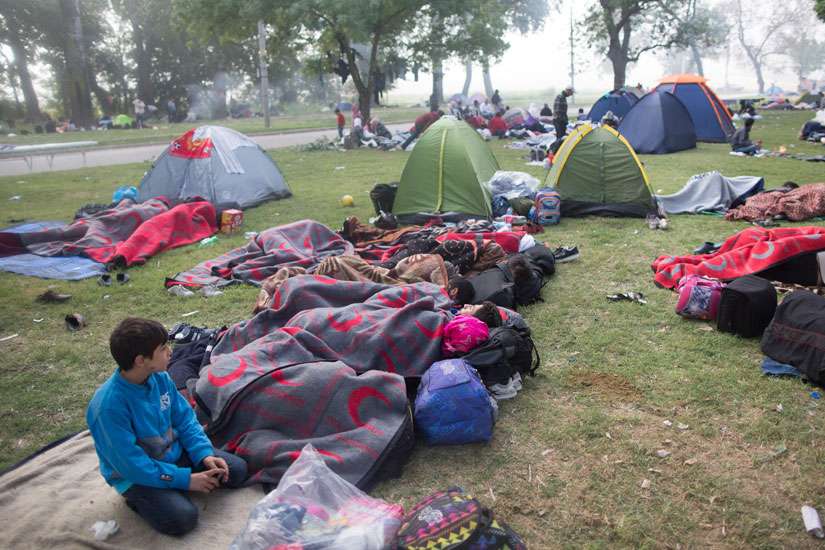Cardinal McCarrick, referring to the current refugee crisis in Syria and Iraq, gave the keynote address at the "Refugee Crisis in the Middle East: A Shared Responsibility," sponsored by the Center for Migration Studies of New York. It was held at the Casa Italiana fellowship hall at Holy Rosary Church.
In his address, he referenced Pope Francis and his call for an end to the "globalization of indifference." Americans, he said, must reject their tendency to overlook the tragedies that affect our fellow humans.
"We must acknowledge, understand and confront the fear that causes us to repel those who only seek our help," said Cardinal McCarrick, retired archbishop of Washington. "This strong opposition of Syrian refugees coming to the United States is an expression of the fear that Americans feel in response to the terror of the Paris and Brussels attacks."
Cardinal McCarrick said that, despite fear, we as a nation "must continue to welcome those feeling persecution, regardless of their faith or nationality."
"We should remember that our nation is founded by refugees escaping religious persecution," said Cardinal McCarrick. "Since our inception we have offered refuge to millions of persons around the world. For many of us, our families are in that group."
Mazlin Kamuona and Omar al-Muqdad, refugees from Iraq and Syria, are among the millions of people who have fled to the United States in the nation's history to escape religious persecution. They spoke during a panel session on resettlement and refugees' experiences of integration into a new country.
Kamuona, an architect in his home country, fled to the United States with his family a few years ago after undergoing torture in his own country.
As a husband and father of four, two sons and two daughters, he understands the value of family.
"Family means everything," said Kamuona. "Today, I have worked hard to raise my family, but living in my home country was so challenging."
Kamuona was kidnapped in 2004 by terrorists and held for 10 days.
"It was the hardest 10 days, because I didn't know if I was going to live, or if my family was going to see me again," said Kamuona.
He, his family and friends gathered $100,000 as a ransom for his life. Soon after being released, he took his family to the safe neighboring country of Jordan.
In 2015, the remainder of his family received their green cards in the United States, and they now reside in Virginia.
"My first day when I came here, my case manager was very welcoming and kind," said Kamuona. "He was waiting to greet me to the United States, and later, would help a lot with the transition state -- getting paperwork and medical appointments. I just want to thank my sponsors, the Catholic charities for helping me."
Despite being in a country far from home, Kamuona said he is now safe with his family.
"I don't have big investments in stocks or bonds, but my biggest investment is my family," said Kamuona. "They are safe now in a free country, and for that I am happy to call the United States my home."
Al-Muqdad, also dealt with his share of trials in his effort to pursue freedom in the United States.
As a journalist in Syria, he was chastised for his criticisms against the government. To protect his identity, he wrote his articles under the pseudonym "Zorro."
"Even writing with a fake name did not save me. I did get caught," said al-Muqdad. "My trial took place in a military court, and I was sentenced to three years in prison. I spend most of it in a terrible military prison where I was subjected to systematic torture for four months. My torture took many different shapes. It was either with what my friends and I called the 'Nazi Chair,' which almost broke my back, or being hanged for hours in a windowsill until I turned into a corpse."
After being released, al-Muqdad went back to work; however to protect his safety, he worked secretly underground.
"When the revolution started in my hometown, the regime did not give any chance to the peaceful protest of my people to go on," said al-Muqdad. "All of us were exposed to the barbaric treatment and the various killings of the Syrian armed forces. Death or (dictatorship), were the only possibilities for me in my hometown. I had no choice but to flee the country undercover."
Al-Muqdad fled to Turkey and found a job as a journalist working with CNN International for one year covering the Syrian refugee crisis, then came to the United States and went to Arkansas.
"In the deep south of Arkansas, I was so pleased by the friendly atmosphere of the people," said al-Muqdad. "I was welcomed with open arms by everyone that I met and I became a part of the community in a matter of weeks. I was astonished by the whole experience of living there. I found the kind of freedom that I needed as a human being and as a journalist. The kind of freedom I wish for all of my people who have lived most of their lives under hostile regime and were deprived of even the minimum of their human rights."


